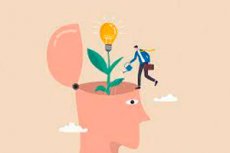Medical expert of the article
New publications
Developing creative thinking: from insight to innovation
Last reviewed: 30.06.2025

All iLive content is medically reviewed or fact checked to ensure as much factual accuracy as possible.
We have strict sourcing guidelines and only link to reputable media sites, academic research institutions and, whenever possible, medically peer reviewed studies. Note that the numbers in parentheses ([1], [2], etc.) are clickable links to these studies.
If you feel that any of our content is inaccurate, out-of-date, or otherwise questionable, please select it and press Ctrl + Enter.

Creative thinking is the ability to go beyond standard schemes and approaches to find new, unusual solutions. In an era when traditional tasks are increasingly automated, creativity is becoming an indispensable skill that determines success in professional and personal life.
Why is it important to develop creative thinking?
- Innovative approach to problems: Creativity allows you to see non-standard ways of solving problems, which is especially important in complex and uncertain situations.
- Adaptability: Creative people adapt more easily to change and are able to generate new ideas in response to that change.
- Competitiveness: In a world where innovation is rewarded, creative individuals and companies have a competitive advantage.
How do you develop creative thinking?
- Practicing mental flexibility: Regular exercises to develop alternative ways of perceiving situations help the brain to be more flexible. This could be playing association games, solving riddles or logic problems.
- Continuous learning: Learning new subjects and skills stimulates the brain's neuroplasticity, strengthening its capacity for creative solutions. Hobbies, online courses, and workshops all fuel creativity.
- An environment for creativity: An environment that encourages experimentation and recognizes the right to make mistakes fosters creativity. Creating such an environment includes not only physical space, but also a culture of openness and acceptance of innovation.
- Idea brainstorming methods: Brainstorming and its variations, such as Edward de Bono's Six Hats of Thinking, help to generate and develop ideas collectively. These methods aim to allow each participant to express and develop their thoughts without fear of criticism.
- Reflection and introspection: Keeping a journal, meditating, or simply taking time to reflect can help you reflect on your own experiences, highlight good ideas, and understand how to improve your thought process.
- Creative habits: Establishing creative habits, such as reading regularly, attending exhibitions, practicing art or music, fosters creativity. It broadens horizons and encourages the development of new approaches to tasks and problems.
- Social networking and exchange of ideas: Networking with people from different walks of life can inspire new ideas and provide a different perspective on familiar things. Networking, participating in thematic communities and conferences broadens your horizons and facilitates the exchange of ideas.
- Visualization and mental maps: Using visualization to structure thoughts and ideas can help in the organization and subsequent implementation of creative projects. Mind maps are a tool that allows you to visualize and relate different concepts and lines of thought.
- Practice Metaphorical Thinking: Metaphors help us see ordinary things in an unusual light, help us develop new approaches, and improve our ability to solve problems creatively.
- Developing observation: The ability to notice details that escape the attention of others can be a source of creative ideas. Mindfulness and meditative practices improve observation and concentration.
- Challenges and creative tasks: Challenges and tasks that stimulate finding non-trivial solutions can activate creative thinking. These can be games, creative competitions or even everyday tasks presented in an unconventional format.
The development of creative thinking not only enriches personal life, but also becomes a valuable resource in professional activities. In today's world, where change is the norm rather than the exception, the ability to think outside the box and think creatively becomes a key competitive advantage.
- The role of education in fostering creativity: The education system plays an important role in fostering creative thinking. A shift away from traditional teaching methods towards more interactive, real-world problem-solving methods can help develop creative skills in learners.
- Developing creativity through technology: Digital technology provides a wealth of tools for developing creativity. From drawing and design programs to music writing and programming apps, access to these resources can greatly enhance creativity.
- Creating an environment for creativity: The environment has a huge impact on creative thinking. Creating a space where one can express ideas, experiment and share opinions without fear is key to developing creativity, both individual and collective.
- The role of leadership in fostering team creativity: Leaders and managers who value and encourage creativity in their teams can significantly increase an organization's innovation capacity. They can create an environment where employees are not afraid to take risks and come up with innovative solutions.
- Continuous learning and self-development: Creativity requires continuous development and learning. Personal initiative in learning new knowledge and skills, participation in creative and educational projects can significantly increase the level of creative thinking.
Creative thinking is not a static quality, but an evolving skill that can be improved and expanded through different methods and approaches. It requires the ability to combine analytical approach and intuition, logic and imagination, realism and dreaming. In today's world full of challenges and opportunities, creative thinking becomes the foundation for individual success and the progress of society as a whole.
Developing creative thinking is a process that takes time and practice. It is not limited to art or design, but permeates all aspects of life, providing new ways to solve problems, express ourselves and interact with the world around us. Nurturing creativity starts small - with the desire to see the world in new ways and not be afraid to experiment.

